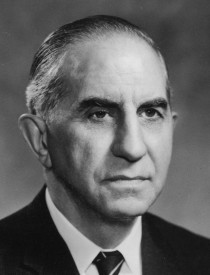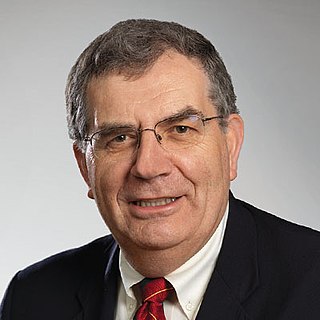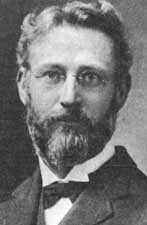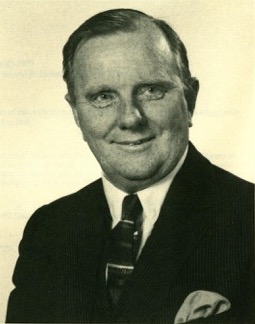Related Research Articles
James Montgomery Boice was an American Reformed Christian theologian, Bible teacher, author, and speaker known for his writing on the authority of Scripture and the defence of Biblical inerrancy. He was also the Senior Minister of Tenth Presbyterian Church in Philadelphia from 1968 until his death.

Charles Hodge was a Reformed Presbyterian theologian and principal of Princeton Theological Seminary between 1851 and 1878.

John Gresham Machen was an American Presbyterian New Testament scholar and educator in the early 20th century. He was the Professor of New Testament at Princeton Seminary between 1906 and 1929, and led a revolt against modernist theology at Princeton and formed Westminster Theological Seminary as a more orthodox alternative. As the Northern Presbyterian Church continued to reject conservative attempts to enforce faithfulness to the Westminster Confession, Machen led a small group of conservatives out of the church to form the Orthodox Presbyterian Church. When the northern Presbyterian church (PCUSA) rejected his arguments during the mid-1920s and decided to reorganize Princeton Seminary to create a liberal school, Machen took the lead in founding Westminster Seminary in Philadelphia (1929) where he taught New Testament until his death. His continued opposition during the 1930s to liberalism in his denomination's foreign missions agencies led to the creation of a new organization, the Independent Board for Presbyterian Foreign Missions (1933). The trial, conviction and suspension from the ministry of Independent Board members, including Machen, in 1935 and 1936 provided the rationale for the formation in 1936 of the OPC.

John Murray was born in Bonar Bridge, Scotland. He was a Scottish-born Calvinist theologian who taught at Princeton Seminary and then left to help found Westminster Theological Seminary, where he taught for many years. He was ordained in the Orthodox Presbyterian Church in 1937.

Charles Augustus Briggs, American Presbyterian scholar and theologian, was born in New York City, the son of Alanson Briggs and Sarah Mead Berrian. He was excommunicated from the Presbyterian Church for heresy due to his liberal theology regarding the Bible.

The Presbyterian Church in the United States of America (PCUSA) was a Presbyterian denomination existing from 1789 to 1958. In that year, the PCUSA merged with the United Presbyterian Church of North America. The new church was named the United Presbyterian Church in the United States of America. It was a predecessor to the contemporary Presbyterian Church (USA).

Sinclair Buchanan Ferguson is a Scottish theologian known in Reformed Christian circles for his teaching, writing, and editorial work. He has been Chancellor's Professor of Systematic Theology at Reformed Theological Seminary since 2017, commuting from Scotland, where he was an assistant minister at St. Peter's Free Church of Scotland, Dundee. He is currently a preaching associate at Trinity Church, Aberdeen
Donald Arthur Carson is an evangelical biblical scholar. He is a Distinguished Emeritus Professor of New Testament at Trinity Evangelical Divinity School and president and co-founder of the Gospel Coalition. He has written or edited about sixty books and served as president of the Evangelical Theological Society in 2022.
Harold John Ockenga was a leading figure of mid-20th-century American Evangelicalism, part of the reform movement known as "Neo-Evangelicalism". A Congregational minister, Ockenga served for many years as pastor of Park Street Church in Boston, Massachusetts. He was also a prolific author on biblical, theological, and devotional topics. Ockenga helped to found the Fuller Theological Seminary and Gordon-Conwell Theological Seminary, as well as the National Association of Evangelicals (NAE).

The Nassau Presbyterian Church is a historic congregation located at 61 Nassau Street in Princeton, New Jersey, United States. It has been the home of many important figures in the history of Presbyterianism in the United States as a result of its proximity to Princeton University and the Princeton Theological Seminary. The church operates the Princeton Cemetery and is a contributing property to the Princeton Historic District. The current pastor is The Reverend Dr. David A. Davis.

Geerhardus Johannes Vos was a Dutch-American Calvinist theologian and one of the most distinguished representatives of the Princeton Theology. He is sometimes called the father of Reformed Biblical theology.

The fundamentalist–modernist controversy is a major schism that originated in the 1920s and 1930s within the Presbyterian Church in the United States of America. At issue were foundational disputes about the role of Christianity; the authority of the Bible; and the death, resurrection, and atoning sacrifice of Jesus Christ. Two broad factions within Protestantism emerged: fundamentalists, who insisted upon the timeless validity of each doctrine of Christian orthodoxy; and modernists, who advocated a conscious adaptation of the Christian faith in response to the new scientific discoveries and moral pressures of the age. At first, the schism was limited to Reformed churches and centered around the Princeton Theological Seminary, whose fundamentalist faculty members founded Westminster Theological Seminary when Princeton went in a liberal direction. However, it soon spread, affecting nearly every Protestant denomination in the United States. Denominations that were not initially affected, such as the Lutheran churches, eventually were embroiled in the controversy, leading to a schism in the United States.
Mariano Di Gangi was a minister of the Presbyterian Church in Canada.

Richard B. Gaffin, Jr. is a Calvinist theologian, Presbyterian minister, and was the Charles Krahe Professor of Biblical and Systematic Theology at Westminster Theological Seminary in Philadelphia, Pennsylvania from 1999 to 2008. He became the Professor Emeritus, Biblical and Systematic Theology in 2008.
George William Knight III was an ordained minister in the Orthodox Presbyterian Church. He was a theologian, author, preacher, churchman, and adjunct professor of New Testament at Greenville Presbyterian Theological Seminary in Taylors, South Carolina. Formerly, he was the founding Dean and Professor of New Testament at Knox Theological Seminary. Prior to his appointment at Knox Theological Seminary, he taught New Testament and New Testament Greek at Covenant Theological Seminary in St. Louis, Missouri. As a pastor, he planted Covenant Presbyterian Church in Naples, Florida and has served numerous other local churches in the Presbyterian Church in America and the Orthodox Presbyterian Church. A former president of the Evangelical Theological Society, he has also taught and preached the Bible at many other seminaries and churches around the world. He has authored several works, most notably The Pastoral Epistles and a short commentary of Timothy and Titus as included in the Baker Commentary on the Bible. He received his theological doctorate from Free University of Amsterdam in 1968. Dr. Knight was a member of the General Assembly-appointed Ad Interim Committee to study the number of ordained offices in the Presbyterian Church in America according to Scripture. His Ad Interim Report of the Number of Offices by George W. Knight IIIArchived 2011-09-27 at the Wayback Machine was incorporated into the polity of the Presbyterian Church in America. He also served on an ad interim committee to study the issue of marriage, divorce and remarriage, which brought about the 1992 publication of a Position Paper of the Presbyterian Church in America on Remarriage and Divorce, 1992.Archived 2011-09-27 at the Wayback Machine.

Philip Edgcumbe Hughes (1915–1990) was an Anglican clergyman and New Testament scholar whose life spanned four continents: Australia, where he was born; South Africa, where he spent his formative years; England, where he was ordained; and the United States, where he died in 1990, aged 75.
Charles Jahleel Woodbridge was an American Presbyterian missionary, minister, seminary professor, founding member of the National Association of Evangelicals, and author of The New Evangelicalism.

William Swan Plumer was an American clergyman, theologian and author who was recognized as an intellectual leader of the Presbyterian Church in the 1800s.
E. Elizabeth Johnson is an American New Testament scholar and the J. Davison Philips Professor of New Testament at Columbia Theological Seminary. She is widely known for her writings on the New Testament, specifically the Pauline Letters.

Earl Frank Palmer was an American Presbyterian minister and Reverend. He served in pastoral ministries at University Presbyterian Church in Seattle, Union Church in Manila, First Presbyterian Church of Berkeley, and The National Presbyterian Church in Washington, D.C. Palmer was known for his expositional preaching and teaching style. He had a strong interest in pursuing theological themes that are present in classic and contemporary literature, with focus on authors such as C.S. Lewis, J.R.R. Tolkien, Karl Barth, and Dietrich Bonhoeffer. Palmer wrote over 20 books, and served on the boards of Princeton Theological Seminary, New College Berkeley, Whitworth University and Regent College.
References
- ↑ Longfield, Bradley J. (1993). The Presbyterian Controversy: Fundamentalists, Modernists, and Moderates. Oxford University Press. ISBN 0-19-508674-0.
- 1 2 "The Charles Rosenbury Erdman Manuscript Collection". Princeton Theological Seminary Libraries. Archived from the original on 2010-06-09. Retrieved 2009-11-18.
- ↑ Longfield., B. J. (1999). D. G. Hart (ed.). Dictionary of the Presbyterian and Reformed Tradition in America. InterVarsity Press. p. 92.
- ↑ "Fund Drive Under Way for Erdman Hall". The Town Topics. 11 December 1969. Retrieved 13 May 2014.
- ↑ "The Princeton Cemetery" . Retrieved 2009-11-18.